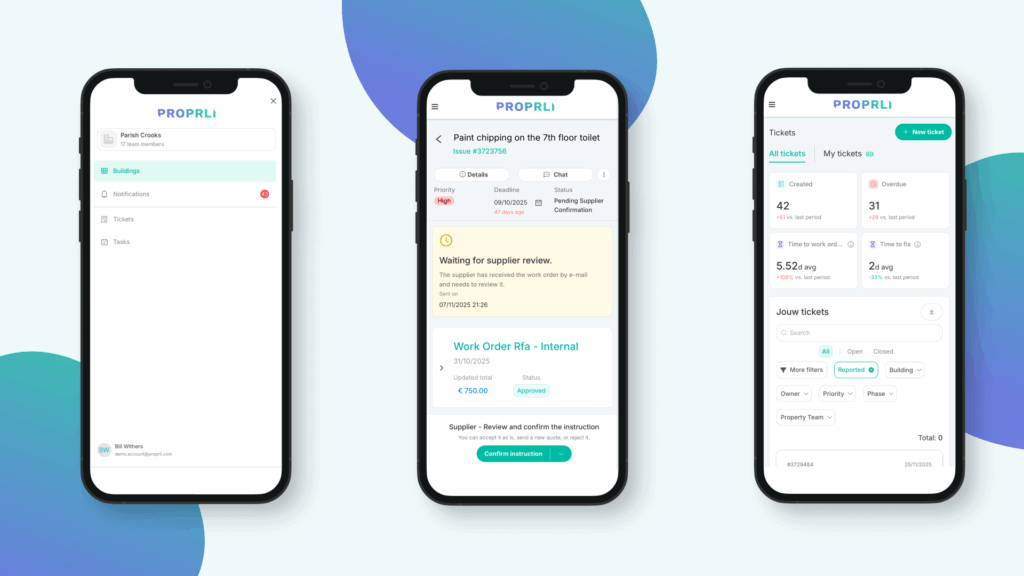The integration of advanced technologies like AI, Big Data, VR, and IoT is revolutionizing the real estate sector. This shift is improving operational efficiency and creating new opportunities for growth. The global real estate market, which combines commercial and residential properties, is worth USD 9 trillion. It’s expected to grow at a CAGR of 5.00% from 2024 to 2032, spurred by population growth and the need for better infrastructure.
Adopting technology in real estate, particularly through PropTech, signifies a major evolutionary step. It enables the more effective management of commercial properties, streamlining of processes, and enhancement of tenant interaction with digital tools.
Key Takeaways
- AI, Big Data, VR, and IoT are key technologies revolutionizing real estate.
- The global real estate market is valued at USD 9 trillion.
- A CAGR of 5.00% is projected from 2024 to 2032.
- PropTech enhances operational efficiency in real estate management.
- Property technology and real estate software streamline processes.
- Digital solutions improve tenant engagement.
- Adopting technology in real estate is crucial for future growth.
How AI is improving operations, compliance, and planning
AI is reshaping real estate tech dramatically. It’s making traditional methods more efficient with its rapid advancements. Through sophisticated data analysis, AI enhances operational effectiveness. This leads to smarter decisions, better property values, and enhanced tenant satisfaction.
AI plays a crucial role in the digital management of real estate. It simplifies compliance with regulations, cutting down the risk of fines. Through predictive maintenance, AI identifies potential problems early, ensuring smooth operations. It also enhances planning and forecasting, helping firms to navigate market trends effectively.
By integrating AI, real estate operations become more dynamic. This technology supports a forward-thinking stance on compliance and strategic planning. As AI evolves, its impact on real estate will grow, fostering innovation and setting new performance standards.
The role of automation in reducing manual work and errors
Automation in PropTech is revolutionizing how we manage properties and assets. It lessens manual work and cuts down on human mistakes in data and transactions. Now, there are efficient tools for managing these tasks.
Automated systems in real estate cover property listings, tenant screening, and rent collection. This makes the whole operation smoother and less error-prone. Using automation saves tons of time, allowing for better strategic planning and improved tenant relationships.
PropTech solutions not only create time savings but also boost customer satisfaction. They ensure interactions are smoother and more dependable. Let’s compare the effects of traditional methods and real estate automation on different aspects:
| Aspect | Traditional Methods | Real Estate Automation |
|---|---|---|
| Property Listing Management | Manual updates, higher chance of outdated information | Automated, real-time updates, increased accuracy |
| Tenant Screening | Time-consuming, manual background checks | Quick, automated screening processes |
| Rent Collections | Physical collection, manual tracking | Automated reminders and payments, seamless tracking |
Using advanced tools for property management smooths out daily tasks. It leads to greater efficiency in managing assets and lowers the chance of errors. Ultimately, this is advantageous for both property managers and tenants.
Emerging PropTech tools to watch by 2030
Looking toward 2030, significant advancements in smart property technology are predicted. These innovations will revolutionize how we manage real estate. With a focus on efficiency and reliability, they aim to improve PropTech real estate management.
Key amongst these advancements are IoT-enabled smart building solutions. They promise heightened efficiency and security for buildings. Remote monitoring and control of property aspects will be feasible. This paves the way for considerable savings and heightened tenant satisfaction.
Another major innovation is AI-driven market analytics platforms. These tools utilize artificial intelligence to offer deep insights into market trends. They analyze extensive datasets to forecast market fluctuations and spotlight profitable investment opportunities. Their use delivers a considerable advantage in the real estate domain.
Blockchain technology is also making strides in ensuring secure transactions. Its aim is to streamline real estate transactions, making them more transparent and efficient. Every transaction is recorded on a decentralized ledger, promoting trust and reducing fraud and errors.
As these technologies advance, their integration into real estate will become indispensable. They promise to enhance automation and introduce smarter management practices. By 2030, adapting to these tools will be vital for maintaining competitiveness and responding to a digitally-driven market.
How to choose scalable, future-ready solutions
Choosing the right scalable PropTech solutions is critical for real estate businesses to stay technologically advanced. Begin by assessing your current systems and the integration capabilities of new technologies. Seek out solutions that can integrate smoothly with your existing operations and support future growth.
Investment in management software that enables data-driven decisions is vital. Such tools offer insights and analytics that can boost your portfolio and ROI. Make sure the software can scale effectively, allowing your operations to grow without major disruptions.
Future-readiness is a crucial consideration. As the market and technologies evolve, your PropTech solutions must be able to adapt easily. This adaptability can come through frequent updates, strong customer support, or compatibility with new digital real estate strategies. The objective is to ensure ongoing operational efficiency and competitiveness.
Here are some tips to guide your selection process:
- Evaluate the scalability of the technology to accommodate business growth.
- Check for integration capabilities with your existing systems.
- Opt for solutions that provide comprehensive data analytics for informed decision-making.
- Ensure the technology can adapt to future market changes and advancements.
- Look for robust customer support and regular updates to stay current.
| Key Feature | Importance | Considerations |
|---|---|---|
| Scalability | High | Ensure the solution can handle increased workloads and user capacity. |
| Integration | Critical | Compatibility with existing systems to avoid operational disruptions. |
| Data Analytics | Very High | Supports data-driven strategies and offers actionable insights. |
| Future-Readiness | High | Adaptable to evolving technologies and market conditions. |
| Customer Support | Moderate | Availability of assistance and regular updates to keep the technology current. |
Pitfalls of ignoring tech shifts in real estate
In today’s fast-paced world, overlooking tech advancements in real estate could be quite costly. Neglecting the advantages of analytics, AI, and the Internet of Things (IoT) might lead to obsolescence, lost competitive advantages, and serious inefficiencies. Companies reluctant to embrace PropTech trends may face higher operational costs and greater tenant dissatisfaction.
Embracing PropTech trends is essential for maintaining relevance in an ever-evolving market. By leveraging real estate analytics, businesses can make informed decisions, boost operational efficiency, and improve tenant experiences. Early adopters of these technologies can secure a leading position in the real estate tech future.
A sound PropTech strategy includes ongoing evaluation of new tech, investing in beneficial systems, and training staff effectively. With a proactive and informed approach, real estate firms can dodge the setbacks of tech ignorance. Thus, they set themselves up for sustained growth and operational superiority.
FAQ
What is PropTech, and how is it changing real estate?
PropTech is revolutionizing real estate with digital advancements. Solutions like real estate software and analytics are streamlining operations. They enhance property management and boost investment decisions.
How is AI improving real estate operations, compliance, and planning?
AI streamlines real estate by automating tasks and ensuring compliance with predictive analytics. It supports strategic planning with insights. Smart tech also monitors property conditions in real-time.
What role does automation play in reducing manual work and errors in real estate management?
Automation tackles routine tasks, such as managing leases and scheduling maintenance. It reduces errors and saves time for strategic planning via management software.
What are some emerging PropTech tools to watch by 2030?
Emerging tools include property management solutions with IoT, blockchain for transactions, and advanced analytics platforms. These tools will offer insights into market trends.
How can I choose scalable, future-ready PropTech solutions?
Choose flexible, integratable solutions like cloud-based management tools and modular software. Ensure they update regularly to match technological progress.
What are the pitfalls of ignoring tech shifts in real estate?
Overlooking tech shifts leads to inefficiencies and higher costs. It results in a competitive disadvantage. Failing to adopt digital solutions risks falling behind in market value.






